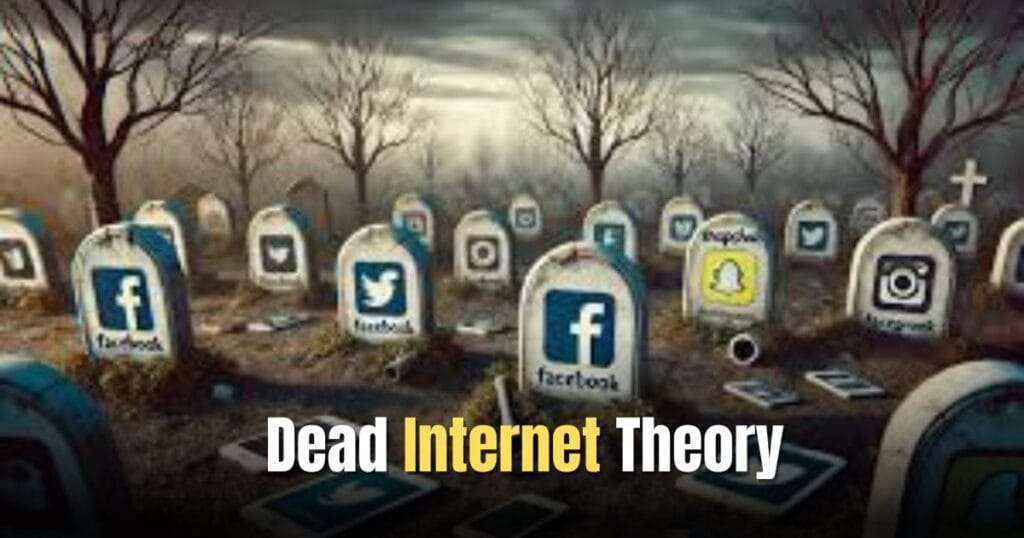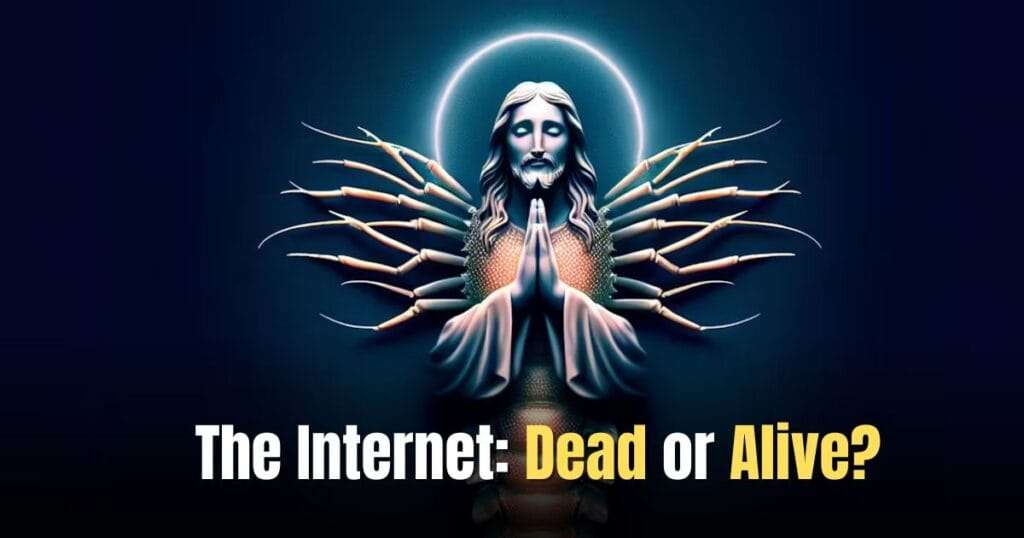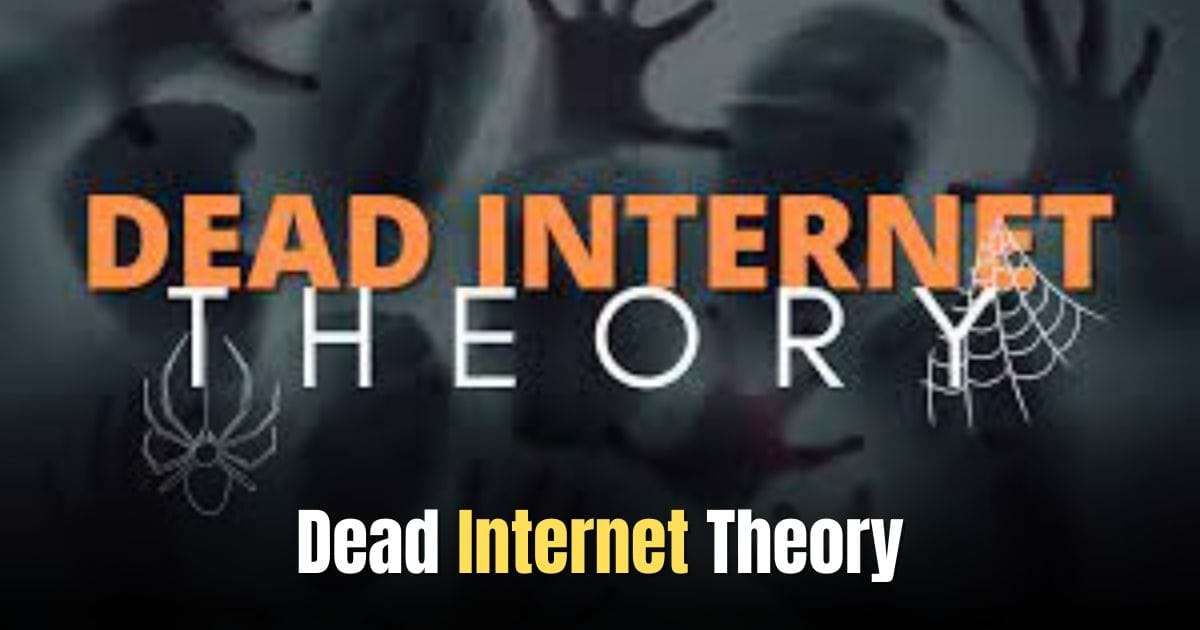Dead Internet Theory is one of those niche but intriguing concepts that swept the internet and specifically circulated in conspiracy-theory circles.

This theory claims that most of the internet we use today is not real-it’s a manufactured system full of bots, phantom users, and content generated by artificial intelligence.
But how much is there to this theory? Let’s take a little deeper look at this idea and explore what’s behind the concept of a “dead” internet.
Contents
What Is the Dead Internet Theory?
The Dead Internet Theory says the internet as we have gotten used to “died” around 2016 and much of the web since then is under control of automated bots, fake content and such. According to this very idea, most online interactions are not with real people but with bots programmed to mimic their human counterparts.
This theory was fueled by people noticing these odd patterns online: things felt repetitive, there was too little diversity of opinion, and something almost synthetic in the interactions between users. But does that make it real?
The Origin of the Dead Internet Theory
The concept began on forums like Reddit and 4chan as users started talking about how the web felt “different” compared to earlier years. Many hinted at growing control by AI, large corporations, and governments in terms of the material surfacing online.
As algorithms began to dominate social media and search engines, users felt that the Internet was no longer composed of other people but rather the curated experience they provided in artificial form.
Bots and Automation-The Building Blocks of a “Dead” Internet
One of the core arguments for the foundation of Dead Internet Theory is that the majority of contents on the web are actually being generated by bots and computer systems.
These bots are highly advanced to the extent that they can produce everything-from news pieces to social media posts, all so difficult to distinguish from manually created content by real people.
Obviously, automation now plays a great role in this newly revamped digital landscape. Business entities engage bots for handling customer care, advertising, and even the creation of content. In the new perspective, these systems have already occupied most of the internet, where most cannot distinguish what is real from what is fake.
Evidence of the Dead Internet Theory
1. The Emergence of Fake Social Media Accounts
Sometimes, while scrolling through social media, one wonders if those “users” are real. Research has shown that most of those “accounts” on the social networks are fake or operated by bots. Bots can produce comments, likes, and shares to make content seem much more popular than it really is.
2. AI-Generated Content
AI tools, such as OpenAI’s GPT-3 and now GPT-4, enable creating output with the look and feel of writing by a human. Indeed, these new capabilities point to important questions about the sincerity of online content.
If a machine or an algorithm can write an article, whom do we believe wrote that next blog post we read-human or machine?
3. Duplicate Content
A dead internet would reveal itself in the repetition of content. It is easy to find that within thousands of online articles and social media posts, virtually nothing new emerges and the same ideas are repeated time over and time again.
Hence, possibly, a dead internet. Algorithms might concentrate on specific types of content. Therefore, it is barren of creativity, truly.
Criticism of the Dead Internet Hypothesis
Although the theory has acquired followers who believe it as gospel, it has its fair share of doubters because, actually, skepticism abounds about it. Experts say that when they speak of the “death” of the internet,
this sense is more a question of the minds or perceptions of the users than the actual need for humans to spend less time on the web. While technology continues to evolve, so do we about connecting with the internet.
Some counterpoints are in order:
1. Algorithms, Not Bots, Shape the Internet
Much of what we experience as “fake” is probably just the product of an algorithm which is permitting us to see only what we like. Algorithms are the foundations of both Facebook and Instagram;
they curate feeds for users so that when we see something over and over, it’s all framed through the prism of our preference. It doesn’t have to mean the bots are in charge just how the modern digital machines work.
2. Mankind Is Still Producing Content
As the myth has it, the robots are the owners of the internet, but thousands of millions of actual people produce content every day.
Influencers on TikTok, bloggers, YouTubers, and any others point to the interminable number of humans producing the content.
The time of the user-generated content platforms has empowered an unattained number of individuals to make their opinions.
3. Automation Must Happen, And it is Not Evil
Yes, automation is part and parcel of the Internet as of today but that isn’t to say it’s all terrible. Bots and AI systems can actually help create more efficiency in the flow of processes with cost-cutting and elevating user experience.
The Dead Internet Theory does not share such an optimistic view, but then there are thousands of people finding day-to-day utility in such technologies.
Also Read:What Is the Budapest Card? Benefits , Free Entry All Details
The Internet: Dead or Alive?
While the Dead Internet Theory does raise some interesting points regarding the changes online interactions have been going through, it is very unlikely that the internet is actually “dead.

” What seems to be happening instead is a form of shift in how content is created and consumed instead of taking over by bots and automation.
While it’s true that AI and automation are reshaping the ‘web landscape, there’s still much of this traffic driven by real people. The internet is not dead; it’s just changing.
Role of Corporations and Governments
To answer that question of which role corporations and governments will play in the shaping of the future of the internet, we need to consider the possibility for darknets and how they might play out in a dominated space of corporate and governmental interests.
Much of what the Dead Internet Theory talks about centers around the corporation and government that now have quite a good hold on what we see and do online.
Algorithms, particularly those emanating from tech monoliths like Google and Facebook, have a pretty big role in determining what content will get attention.
According to various critics of the same system, the internet has become too centralized, in particular, into the hands of few big players in control of the information flows.
Censorship is another problem, personal privacy has been lost, as well as the formation of echo chambers for people to see only that which corroborates their already existing views.
Conclusion: Dead Internet Theory-A Conspiracy Theory?
There are legitimate concerns raised by the widening automation and corporatization of the internet, but the Dead Internet Theory may be a more myth than fact.
Change is always happening and so too is how we interact with content on the internet. The presence of bots and artificial intelligence has always defined the current landscape of the internet,
but in no way does this necessarily say that this is the cause for the activity happening here. Ultimately, this is where actual human beings come together, create, and share ideas.
FAQ’s By Dead Internet Theory: Unraveling the Mystery of a Digital Ghost Town
1. What is Dead Internet Theory?
Dead Internet Theory describes the internet as being owned no longer by humans, but by bots and artificial intelligence, thereby making it a “dead” web experience.
2. How long has the internet been “dying,” according to the theory?
Dead Internet Theory claims that the internet has been “dying” since 2016 because of the time when bots and automated systems started overtaking and took away its original feel.
Actually, though there are far too many bot accounts or fake social media accounts, most accounts do not belong to fakes. But it does not mean that bots do not amplify content.
4. Is AI the cause why the internet is not creative?
While AI writers and so-called deepfakes did help repeat information, humans create most distinct original content on the internet that users utilize today.
5. How can I identify whether the content is fake or artificial?
It is difficult to know, and even impossible, if ever, if the content generated by AI. However some subtle features such as generic information, lack of first person experience, and repetition of phrases would indicate the generation through a machine.



Pingback: Kotakinozomu-neowase-The Perfect Blend of Tradition and Modern Innovation
Pingback: Top PS5 Pro Enhanced Games You Can’t Miss 2025